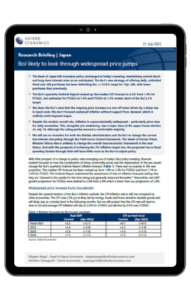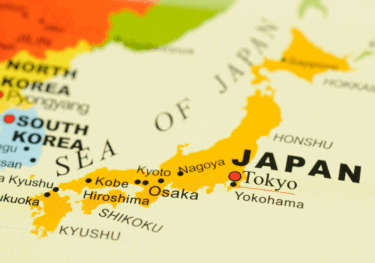BoJ likely to look through widespread price jumps

The Bank of Japan left monetary policy unchanged at today’s meeting, maintaining current short- and long-term interest rates as we anticipated. The BoJ’s new strategy of offering daily, unlimited fixed-rate JGB purchases has been defending the +/-0.25% range for 10yr JGB, with lower purchases than previously.
The BoJ’s quarterly Outlook Report revised up the median CPI forecast to 2.3% from 1.9% for FY2022, but estimates for FY2023 at 1.4% and FY2024 at 1.3% remain short of the BoJ’s 2% target.
What you will learn:
- We share the BoJ’s view that the ongoing price increase is a one-off event driven by a sharp rise in input costs. We don’t forecast sustained inflation without support from demand, which is unlikely amid stagnant wages.
- Despite the modest overall rate, inflation is unprecedentedly widespread – particularly price rises for daily necessities. This, alongside yen weakening, was a major issue at the upper house election on July 10, although the ruling parties secured a comfortable majority.
- We still see no incentive for both the Kishida administration and the BoJ to change the current low interest rate policy through the Yield Curve Control framework. The death of former Prime Minister Shinzo Abe is unlikely to change the overall macroeconomic framework in the near future.
Tags:
Related posts

Post
Tariffs and Politics Leave the BoJ Powerless in Japan
The Bank of Japan kept its policy rate at 0.5% at its July meeting. We continue to think the BoJ will exercise caution on rate hikes despite still-high inflation and a recent trade deal with the US.
Find Out More
Post
US-Japan Trade Deal Fails to Shift Japan’s Growth Outlook
We estimate that the US's effective tariff rate on Japanese products is around 17%, in line with our baseline assumption. Lower tariffs on autos are a positive, given the sector's significant contribution to the economy and its broad domestic supporting base
Find Out More
Post
Japan’s Rising Political Instability Will Undermine Fiscal Discipline
The ruling Liberal Democratic party (LDP) and its partner Komeito lost their majority in Japan's upper house elections on July 20. Although Prime Minister Shigeru Ishiba will likely stay to avoid political gridlock, especially to complete tariff negotiations with the US, the political situation has become fluid and could lead to a leadership change or the reshuffling of the coalition.
Find Out More